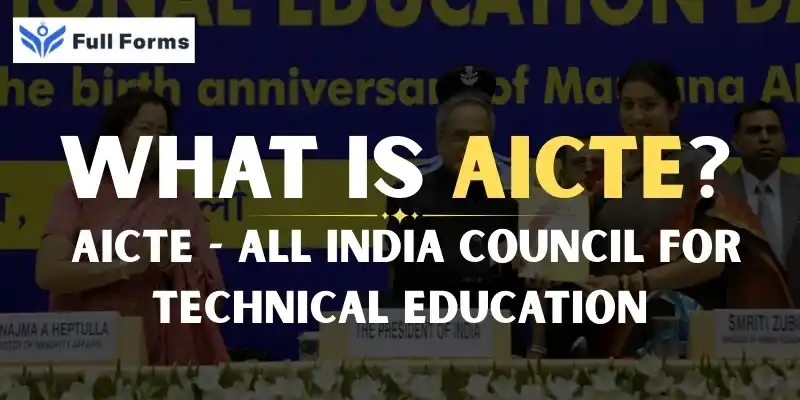All India Council for Technical Education
(AICTE)

Description
The All India Council for Technical Education is helping to shape India's technical future.
In a country like India that is so diverse and always changing, it is hard but important to keep the quality of technical education high. The All India Council for Technical Education (AICTE) is the main organization behind this mission. It is a national-level advisory body that is very important for planning, developing, and overseeing the country's technical education system. AICTE has been the main organization for engineering, management, pharmacy, architecture, and other technical fields in India for decades.
What is the All India Council for Technical Education?
It came into existence in 1945, gaining statutory status in 1987 as per an Act of Parliament. The AICTE works under the aegis of the Department of Higher Education, Ministry of Education, Government of India. The role that it has to ensure is that systems related to technical education in India keep changing with global trends, at the same time meeting industrial, economic, and technological needs within the country.
AICTE grants approval to technical institutions, quality sustenance, disbursing funds for research and development, fostering innovation, and ensuring the spread of such modern and meaningful education to students across India.
Core Functions and Responsibilities
The core functions of AICTE emanate from the responsibility of nurturing a healthy ecosystem for technical education. These can be summarized as follows:
Approval Granting to Institutions
Any technical college planning to offer programs in the areas of engineering, management, architecture, or any other related fields should first seek and obtain approval from AICTE. This is a method through which standards relating to infrastructure, faculty, and curriculum support for students by an institution are met.
AICTE undertakes regular revision and up-gradation of the curriculum in all disciplines so that it is made contemporary with the most recent advances in technology and requirements from industry. Thus, the vision introduces skill-based learning, industrial internship, and entrepreneurship modules.
Uplift
Skill Upgradation: AICTE has further introduced schemes like MODROB wherein the institution working on an innovative research project and students thereof are provided incentives through funding under its another scheme named RPS-Research Promotion Scheme.
Recognizing the importance of having well-trained educators, AICTE conducts faculty development programs and grants provisions for the upskilling of teachers in the areas of emerging technologies such as Artificial Intelligence, Machine Learning, Data Science, and Robotics.
Equity and Access
AICTE ensures inclusive education in its support toward the students from economically weaker sections, women inclusiveness in STEM, and technical education in rural and underprivileged areas.
Key Initiatives and Reforms
Over the years, AICTE has initiated several futuristic initiatives toward the modernization of technical education:
NEAT (National Educational Alliance for Technology) It is a public-private partnership scheme that brings advanced learning technologies and ed-tech solutions to students.
Smart India Hackathon It is a platform for innovation by encouraging students to solve real-life challenges posed by several departments of the government and industries.
AICTE Internship Portal This centralized portal connects students with various industry internships and practical training opportunities.
From soft skills to coding bootcamps, a list of programs falls under the training that AICTE supports toward the direction of employability enhancement for its students.
The Role in National Development
AICTE is not just about regulation—it is about transformation. With the increasing dynamism in the world’s economies, there has never been a time when India needed a technically trained workforce more than now. Through strategic planning, AICTE assures an academically sound student who is also ready for the industry.
Through inculcating a discipline of innovation, study, business venture, and ethics, AICTE takes part in the molding of such professionals who make roads, plan smart cities, head startups, write codes among others who join defense as well as public service.
India has thousands of engineering and technical colleges. Maintaining quality control over such large numbers has become one of the most herculean efforts for AICTE. Through regular audits, inspections, rankings, and performance assessments, the council tries its best to plug gaps in the education delivery system.
Further, it encourages digital tools and online learning through blended models as a solution for ensuring quality education in remote and under-resourced areas.
AICTE has a very student-centric approach-with scholarships for students, support to the startup incubation centers, and national-level competitions it hosts. The fruit of all this labor is towards building up an environment where students feel powered up to fulfill their dreams.
Conclusion
The All India Council for Technical Education comprises much more than another regulatory body-it is the soul that leads India's journey in technical education. Right from policy formulation to talent nurturing and innovation enabling, AICTE ensures Indian students are prepared both for current labor markets and to shape the future. As technology keeps on redefining worlds, AICTE recommits itself to an inclusive, future-ready, truly world-class education system.
